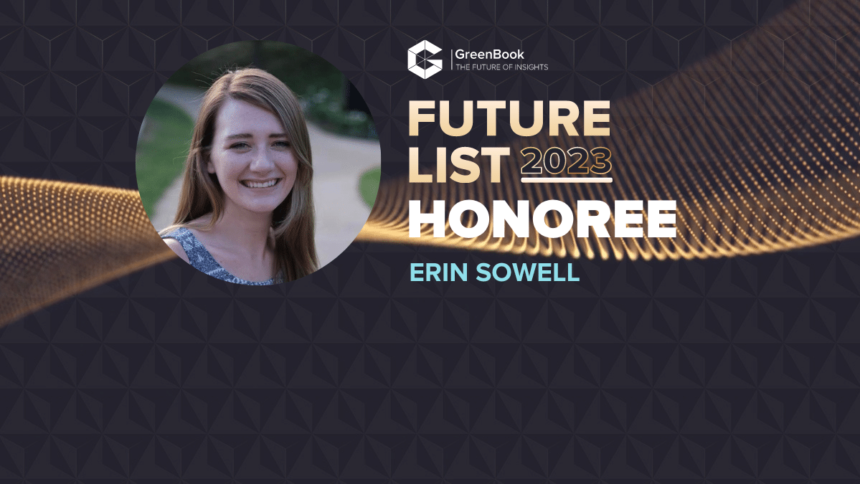Skateboarding: I love skating down hills in particular. I’ll wander around my neighborhood skating from hill to hill to hill. It feels so good… like you’re flying!
Rollerblading: I like to “figure skate” on my rollerblades. It’s fun to listen to music and spin around.
Going to the Movies: My friends and I are regulars at AMC. We love to see thought-provoking movies: dramas, epics, biopics, documentaries, etc.
Gardening: I really love plants. I especially love plants that make food. I decided that I want my 2023 garden to have an unreasonable amount of tomatoes! I also have a thriving strawberry patch. It’s nice to go out between meetings, tend to my garden, and snack on tomatoes and strawberries. I’m very excited to see what this year’s garden brings.
When did you know you wanted to enter a career in insights, and what inspired you?
I found my way to the insights industry through entrepreneuership. When I was a in college, I was a fellow in Lehigh University’s Sustainable Development Lab. During the fellowship, we were given 10 weeks to find a sustainability issue, come up with a market based solution, and build a prototype. My team decided to focus our efforts on the issue of indoor air pollution. Through our research, we found that plants naturally filtered air and thought that this could be an interesting way to draw attention to the issue.
Thus, we set off to develop a plant-based air purifier. Initially, we went through a product discovery phase where the team did research to learn all about the air quality issues, the current solutions, the house plant market, etc. We then created a very rough prototype and did a scrappy experiment to test its effectiveness. After the fellowship concluded, I continued developing the air purifier with a partner. We worked together to turn the very rough prototype into a minimum viable product via an iterative design process which involved even more research. During this phase, our research focused on interior design.
We would go into stores like Anthropologie, Urban Outfitters, etc. and ask workers questions to understand what sorts of products sold well and which didn’t, why the store was designed the way it was, how they picked their merchandise, etc. We’d also stop people on campus to hear their thoughts on our designs and prototypes. At the time, I thought I was just being an entrepreneur! I had no idea there was a whole industry that specialized in this work.
Eventually, the air purifier venture reached a point where it was time to go full steam ahead or shut the door. I took some time to think about what I wanted from my career, did a bunch of informational interviews, discovered the insights industry, and went full steam ahead in that direction instead.
What do you think the key characteristics or qualities of a leader are? How does this play into MRX?
I think that the most influential, impactful leaders are curious, brave, empathic, inclusive, and inspiring.
Curious leaders like to explore and learn. This allows them to uncover opportunities and create environments that set their teams and clients up for success. Curious leaders admit that they do not know everything and are open to new experiences and ideas.
Brave leaders are bold and confident in the face of uncertainty. They are comfortable feeling uncomfortable and have a strong point of view. They are assertive and take their teams and clients to places that others have never been before.
Empathetic leaders are tuned into the emotional world. They focus on understanding the perspectives, feelings, and needs of their teams, clients, and partners. This understanding enables them to provide the right level of support and encouragment. Feelings matter in business.
Inclusive leaders treat people fairly, respectfully, and make other feel like they belong. They help people connect across differences and ensure that everyone feels seen, heard, and valued. Inclusive leaders build thriving communities.
Inspiring leaders motivate others to take action. They are driven by their values and help others understand their purpose and why their work is significant. They are uplifting and bring out the best in their teams, clients, and partners.
What trends do you see making headway on the hoizon of insights? What trends do you think will falter in years to come?
I hope that Marketing Ecology becomes a trend within the industry. Marketing Ecology is the science of thriving! Specifically, Marketing Ecology is the scientific study of the transactions, relationships, and dynamics between brands, products, customers, employees, and the marketing environment. It gives us the ability to hollistically understand the market ecosystem and optimize the way we’re interacting, exchainging value, and forming relationships.
By applying Marketing Ecology, we set our brands, customers, and communities up for success! I stumbled upon Marketing Ecology completely by accident. When I was an undergradate, I majored in Earth & Environmental Science with a focus on Natural Ecology. I’ve always been fond of animals and plants! I was very curious to learn about how natural ecosystem worked, how the planet worked. My studies took me to all sorts of environments. I investigated tropical jungles, coral reefs, rivers, swamps, bogs, etc. I even investigated ancient environments through pollen analysis! It was awesome. 🤘
After college, I decided to go into business and join the Insights Industry. As I was pursuing my Master of Marketing Research at the University of Georgia and starting my first job at 84.51°, I noticed many similarities between marketing and natural ecology. The themes were the same: competition, strategy, evolution, etc. Overtime, stores started to look more and more like natural ecosystems with living things (i.e., brands, products, consumers, employees, etc.) competing over limited resources. Eventually, it was clear that nature and marketing followed the same principles, which meant that I could apply environmental science and ecology to my work.
Now, I’m pioneering the field of Marketing Ecology with Marcus Cunha Jr. PhD, marketing professor & director of the UGA MMR program. We’re writing a book, developing Thoughtful Research, and launching a brand new methodology called The Keystone Transformation: a scientific approach to marketing & business decision making that connects brands with opportunities and sets marketing & innovation up to thrive in the marketing environment. Marcus and I would love to see Marketing Ecology become a industry trend! 😊








